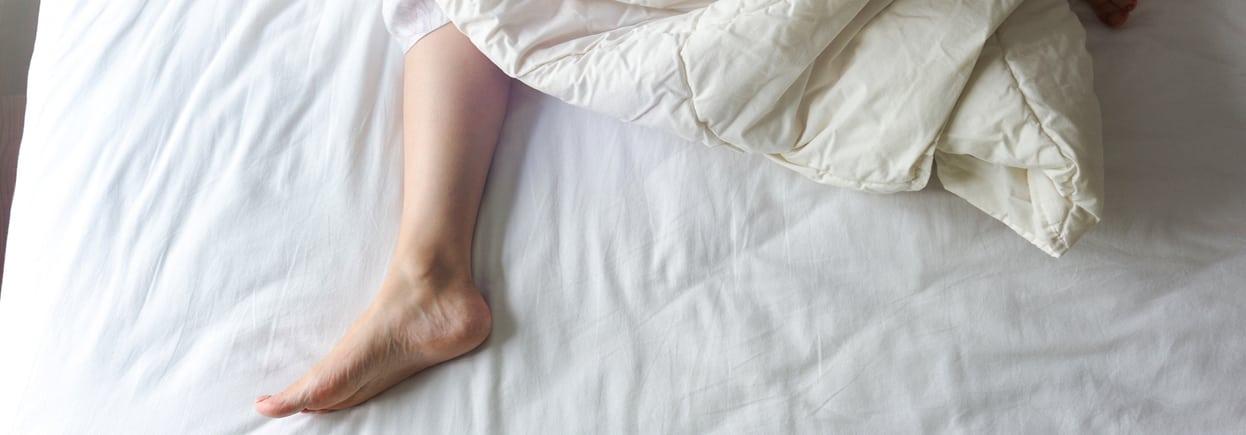Good health depends on a good night’s rest, but in the wee hours, sleep eludes many of us; some estimates suggest that as many as 30 percent of adults have insomnia, defined as an inability to fall asleep at least three times a week over several months.
Many factors, such as stress, certain medications, poor sleep hygiene, or alcohol or caffeine close to bedtime, can play a role in why some of us toss and turn each night. But genetics also influences our ability to sleep.
This week, 23andMe released a new Insomnia report (Powered by 23andMe Research) and available to 23andMe+ Premium members.
About the Report
The new 23andMe+ report on insomnia uses data from people who have consented to participate in 23andMe research. Leveraging this data, we use machine learning techniques to estimate an individual’s likelihood of developing insomnia.
The estimates factor in that data and use statistical modeling that includes thousands of genetic markers and information on an individual’s ethnicity and birth sex. Together, all this data is used to calculate the genetic likelihood of developing insomnia. Customers can learn more about the science and methodology behind our new report in this white paper.
The report provides users with helpful information on their estimated genetic likelihood of developing insomnia, but it is not a substitute for clinical diagnosis or treatment.
What is Insomnia?
All of us struggle to get to sleep occasionally, but insomnia causes persistent problems with not just falling asleep but staying asleep. Insomnia can last a few days or weeks, but when it lasts more than three months or more, it is considered chronic.
Beyond external factors like stress, diet, or medication, scientists are still trying to understand the genetics of insomnia fully.
Insomnia is highly polygenic, meaning many different genes are associated with the condition. Still, several studies have narrowed down on a combination of genetic factors that contribute to the disruption of the sleep-wake cycle or change the chemical cycles in the brain that control sleep. In 2022, 23andMe collaborated with researchers at Vrije University in Amsterdam that included data from more than 2.3 million individuals and identified 289 genetic variants associated with insomnia.
The impact of sleep or the lack of sleep has been well studied. The more obvious symptoms are daytime drowsiness, low energy, and trouble concentrating or remembering things. Drowsiness itself contributes to other public safety issues, such as car accidents. But insomnia can also impact mental health. It’s associated with depression and anxiety, for instance. Long-term insomnia is also associated with health conditions such as high blood pressure, heart disease, and diabetes.
For people who have chronic insomnia, treatment with cognitive behavioral therapy and lifestyle modifications can help address the causes of insomnia. In extreme cases, doctors may recommend sleep-aid medications that can help too.
More on Sleep
Sleep allows our bodies and brains to shut down and rest. But there is more going on during sleep, especially during the various stages of sleep, each linked to different electrical patterns in our brains that all likely play an essential role in health.
There are two types of sleep — rapid eye movement or REM sleep and non-REM sleep. Non-REM sleep is often where we begin, and it is characterized by a slowing down of your heart rate and breathing but a period during which you are more easily awakened.
There are different stages of non-REM sleep, with each stage characterized by slower brain waves; the deepest stage of non-REM sleep includes periods with very low frequency waves, known as Delta waves, and is considered restorative.
You dream during REM sleep. The stage is characterized not just by rapid eye movement but also by rapid breathing and heart rate and blood pressure increases. Typically, a person enters REM sleep an hour or an hour after falling asleep, lasting about 10 minutes to an hour. After REM sleep, the process repeats. Typically, about a fifth of our sleep is REM sleep.
Dreams and REM sleep help with learning and making memories. Other stages of sleep, for instance, are crucial for creating pathways for learning and remembering.
Researchers are still trying to understand why sleep is so essential. 23andMe scientists and their collaborators have looked at several components of sleep, including wake times, sleep apnea, and REM sleep.
More 23andMe Reports on Sleep
23andMe also offers customers various sleep-related reports. Those include wellness reports on deep sleep, sleep movement, and 23andMe+ reports (Powered by 23andMe Research) on obstructive sleep apnea and restless leg syndrome. These different sleep-related issues could affect sleep patterns and contribute to restlessness.
In 2021, during the height of the COVID pandemic, 23andMe conducted a sleep survey, which found that the pandemic had a profound impact on sleep. It was also consistent with other published studies during the period. Another study published in 2021 noted that sleep disruption and stress among healthcare workers during the pandemic were also associated with a higher risk of infection and more severe symptoms from COVID-19. However, broad population-wide changes in sleep patterns are relatively easy to study.
Along with the new 23andMe+ Insomnia report (Powered by 23andMe Research), 23andMe also has a collection of other sleep-related reports. Some are included in the 23andMe+ Premium membership, such as the Obstructive Sleep Apnea and the Restless Leg Syndrome reports (Powered by 23andMe Research). But 23andMe’s Health + Ancestry Service also includes sleep-related Wellness reports, including reports on Deep Sleep, Sleep Movement, and Wake-Up Time. Each is meant to look at how your genetics may play a role in the quality of your sleep.
Find Out More
23andMe+ Premium members can click here if they wish to view their report.
Current 23andMe Health + Ancestry Service customers on the current genotyping chip can receive this and 35+ other reports by joining a 23andMe+ Premium membership within their account. Learn more here.
Not a 23andMe+ Premium member yet? Learn more about what 23andMe has to offer here.




